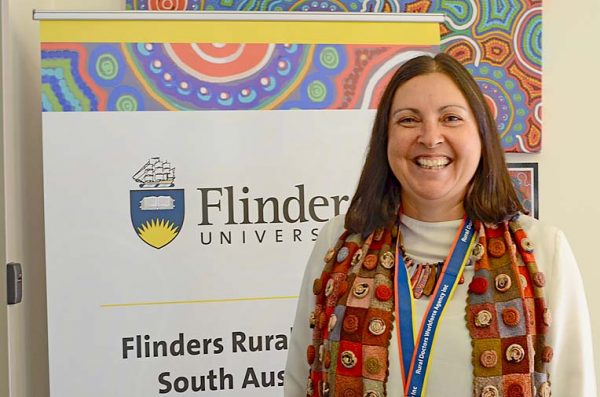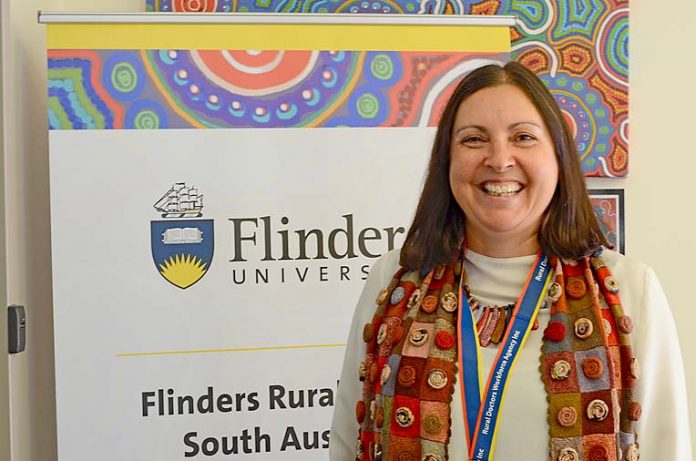
FOR 25 years, Professor Lucie Walters has served the Mount Gambier community as a rural GP and more recently as a key figure in training the next generations of doctors.
She has been instrumental in bringing rural generalist training to the region through the Flinders University Rural Clinical School since 2002.
Her contribution to rural medical education earned her a term as president of the Australian College of Rural and Remote Medicine and to hear her talk about the experience is to understand just how passionate she is about rural health.
With tears welling in her eyes, Prof Walters spoke of her fellow rural generalists serving remote communities across the country.
“I felt so privileged to be appointed as president, but also completely ill-prepared for such a role – for me it was more significant emotionally than if I was asked to be president of the World Bank,” she said
“Everywhere I visited, the stories of people who commit their lives to their communities and to being the best doctor they can be was so inspiring.”
While she acknowledged the efforts of her colleagues, she remained modest about her own achievements over the past two and a half decades, of which there have been many.
Prof Walters completed a two-week placement in Mount Gambier as a medical student and returned to the city in 1992.
“My dad is a geologist so I moved 17 times before I was nine years old and mostly we lived in small rural communities this size or smaller,” she said.
“My two week placement here was meaningful and my husband Phil has family connections here.
“The best predictor of becoming a rural doctor is where your spouse went to primary school, the next best is having a rural background and the next best is having a meaningful long-term placement in a rural area.”
For her first 10 years in the region, Prof Walters worked as a registrar and later a partner at Hawkins Clinic while also providing hospital care.
“In 2002, I had my mid-life crisis early – because I’m efficient – and realised that I was the youngest Australian trained doctor to come to Mount Gambier and stay for longer than 12 months,” she explained.
“We were getting registrars after they had finished med school coming here and doing one year of GP training, but then they were moving on and leaving town.
“I was lucky enough to meet Dr Paul Worley at that time and he employed me to work for Flinders Uni here in Mount Gambier.
“In 2003, we started having med students in this region for a full academic year.”
Prof Walters described that first year as both “exciting and frightening”.
“I felt I was a reasonably competent GP, but a real novice teacher,” she explained.
“We had seven students who trusted that I could facilitate their training to pass third year med, which is probably the hardest year.
“I had nightmares that there might be some secret subject I didn’t know about, but they all did really well and that was down to the commitment of GPs in the region.”
She explained that the journey from high school student to rural generalist (a GP who also works in a hospital) takes 11 years of training.
“When I arrived here as a med student, you could complete only one year and two weeks of that 11 year journey here in Mount Gambier,” Prof Walters said.
“Now you can do nine of those 11 years here.
“I am so proud of the team and partners we have – the GPs and specialists in the hospital – who have been able to create those nine years of training in a town this small.”
While she has received a number of accolades – including national recognition for her innovation in rural health – Prof Walters said she simply felt lucky to have enjoyed a diverse career.
“I completed an elective in New Zealand in a very small community that really cemented my desire to do everything,” she said.
“I’m not very good at choosing and there is no part of medicine that I don’t like.
“I have had a lovely career where I have been able to move from one disciplinary area and one style of practice to another and I have been able to do that all within Mount Gambier so I can service the community in different ways.”
She said the most rewarding aspect of her work was forming personal relationships with patients and students.
“For some people I have delivered their baby and I follow their journey as a parent, or with other patients I am with them through ill health and sometimes palliative care,” Prof Walters said.
“Illness can bring out the best and worst of humanity in each of us.
“Similarly, I have formed really close relationships with students as you see the best and worst in them – medicine is stressful.
“I find it especially rewarding watching students develop over their career and seeing the remarkable doctors they have become.”
With 25 years in rural health behind her, Prof Walters said she had no intention of slowing down.
“I might not be working in another 25 years time, but at this stage I’m lucky to have an amazing team around me,” she said.
“Those last two years of training are still not available here, so there is more work to do yet.”








